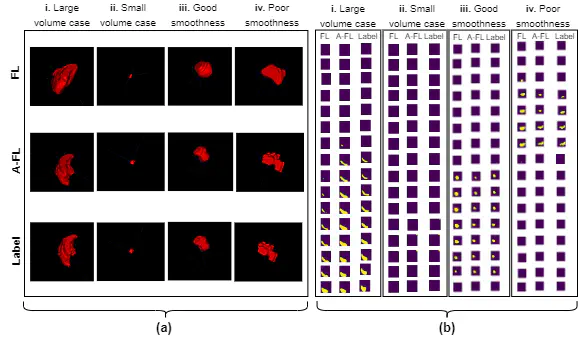Enhancing Semantic Segmentation with Adaptive Focal Loss

Announcing Our Latest Research: Enhancing Semantic Segmentation with Adaptive Focal Loss
We are excited to present our groundbreaking research, “Enhancing Semantic Segmentation with Adaptive Focal Loss: A Novel Approach.” This study tackles the persistent challenges in medical image segmentation, especially for objects with irregular boundaries or small sizes, by introducing an innovative loss function that significantly improves segmentation performance.
Our research introduces the Adaptive Focal Loss (A-FL) function, designed to address class imbalance by down-weighting the loss for easier examples and up-weighting it for harder ones. This dynamic adjustment ensures greater emphasis on challenging examples, such as small and irregularly shaped objects. The A-FL function adapts its focusing parameter based on surface smoothness and size information, while the class balancing parameter is adjusted according to the ratio of targeted area to total area in an image.
We evaluated the A-FL function using the ResNet50-encoded U-Net architecture on the Picai 2022 and BraTS 2018 datasets. On the Picai 2022 dataset, A-FL achieved an Intersection over Union (IoU) of 0.696 and a Dice Similarity Coefficient (DSC) of 0.769, outperforming regular Focal Loss by 5.5% and 5.4%, respectively. It also surpassed the best baseline Dice-Focal by 2.0% and 1.2%. On the BraTS 2018 dataset, A-FL achieved an IoU of 0.883 and a DSC of 0.931. These results demonstrate that the A-FL function significantly surpasses conventional methods, including Dice Loss, Focal Loss, and their hybrid variants, in key metrics such as IoU, DSC, Sensitivity, and Specificity.
Our study underscores the potential of A-FL to enhance deep learning models for segmenting clinically significant regions in medical images, leading to more precise and reliable diagnostic tools. We invite you to explore our full paper for a detailed discussion of our methods, experiments, and findings. We welcome your feedback and look forward to future collaborations as we continue to advance the field of medical image segmentation.
Authors: Md Rakibul Islam, Riad Hassan, Abdullah Nazib, Kien Nguyen, Clinton Fookes, Md Zahidul Islam
Affiliations: Islamic University, Bangladesh; Bangladesh University of Engineering and Technology; Green University of Bangladesh; Queensland University of Technology